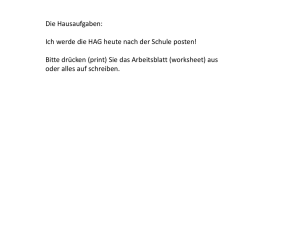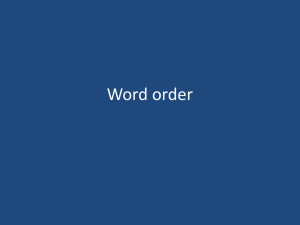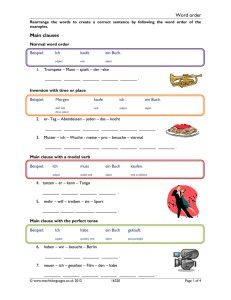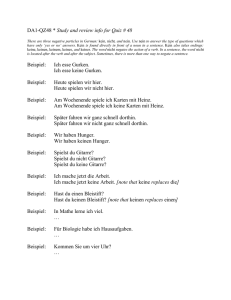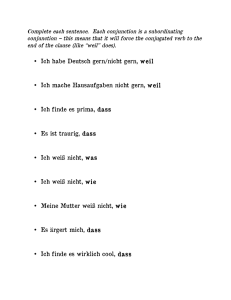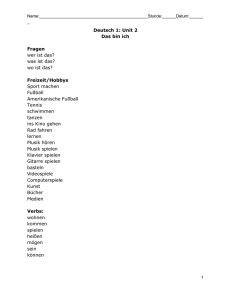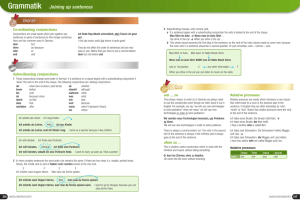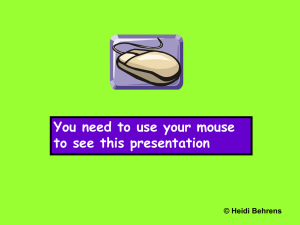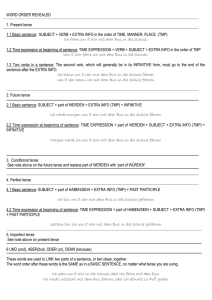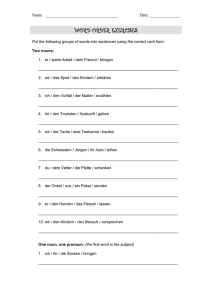Name ___ Klasse ______ Datum Deutsch I – Kapitel 3
Werbung
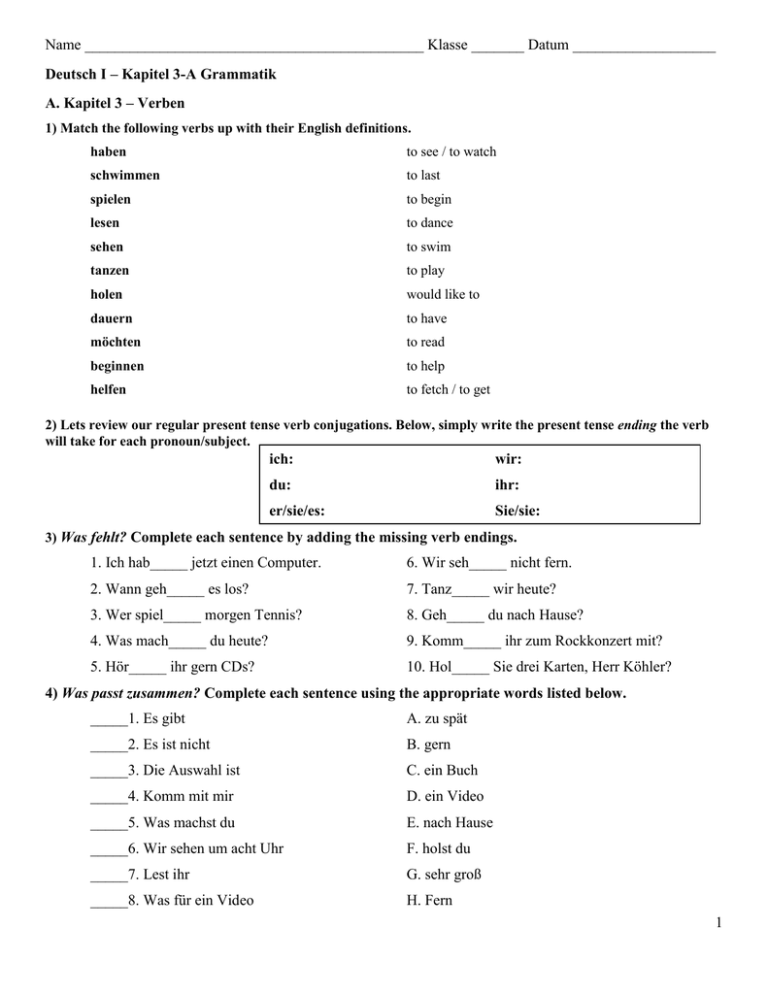
Name _____________________________________________ Klasse _______ Datum ___________________ Deutsch I – Kapitel 3-A Grammatik A. Kapitel 3 – Verben 1) Match the following verbs up with their English definitions. haben to see / to watch schwimmen to last spielen to begin lesen to dance sehen to swim tanzen to play holen would like to dauern to have möchten to read beginnen to help helfen to fetch / to get 2) Lets review our regular present tense verb conjugations. Below, simply write the present tense ending the verb will take for each pronoun/subject. ich: wir: du: ihr: er/sie/es: Sie/sie: 3) Was fehlt? Complete each sentence by adding the missing verb endings. 1. Ich hab_____ jetzt einen Computer. 6. Wir seh_____ nicht fern. 2. Wann geh_____ es los? 7. Tanz_____ wir heute? 3. Wer spiel_____ morgen Tennis? 8. Geh_____ du nach Hause? 4. Was mach_____ du heute? 9. Komm_____ ihr zum Rockkonzert mit? 5. Hör_____ ihr gern CDs? 10. Hol_____ Sie drei Karten, Herr Köhler? 4) Was passt zusammen? Complete each sentence using the appropriate words listed below. _____1. Es gibt A. zu spät _____2. Es ist nicht B. gern _____3. Die Auswahl ist C. ein Buch _____4. Komm mit mir D. ein Video _____5. Was machst du E. nach Hause _____6. Wir sehen um acht Uhr F. holst du _____7. Lest ihr G. sehr groß _____8. Was für ein Video H. Fern 1 B. Present Tense of haben (S. 64) The ______________________________ forms of haben do not all follow the forms of all _________________________ verbs. Therefore, haben is know as an haben: ____________________________________ ______________________________ ich: wir: verb. Conjugate this verb in the box du: ihr: to the right. er/sie/es: Sie/sie: 1. Was fehlt hier? Complete each sentence by using the correct form of haben. 1. Um wie viel Uhr ______________________________ du Zeit? 2. ______________________________ Sie einen Bruder? 3. Jan ______________________________ ein tolles Video. 4. ______________________________ ihr ein neues Computerspiel? 5. Die Familie ____________________________ einen Jungen und ein Mädchen. 6. Ali und Tanja ___________________________ zwei Karten zum Rockkonzert. 7. Wir ______________________________ ein gutes Buch. 8. Ich ______________________________ eine Tante. 9. ______________________________ du einen Computer? 10. Thomas ______________________________ eine neue Freundin. C. Word Order (S. 69) Do you remember the word order in a German sentence? In a ____________________ sentence, the subject is followed by the __________________ and then by other information. However, if a sentence is not started with the __________________________, the ________________________ word order is used for questions as well as for _________________________. Remember: The ________________ always remains in second position! 1. Give the following statements an inverted word order so that they do not begin with the subject. Beispiel: Ich komme um elf Uhr rüber. Um elf Uhr komme ich rüber. a. Du spielst morgen Tennis. __________________________________________________________________ b. Ich sehe heute fern. _______________________________________________________________________ c. Ulrike tanzt am Samstag. ___________________________________________________________________ d. Wir gehen um dreizehn Uhr zur Videothek. ____________________________________________________ e. Ihr spielt später Fußball.____________________________________________________________________ 2. Übung #2 auf Seite 61 im Textbuch: Was machst du diese Woche? 3. Übung #9 auf Seite 69 im Textbuch: Was machen sie? 2 Name _____________________________________________ Klasse _______ Datum ___________________ Deutsch I – Kapitel 3-B Grammatik A. zu Hause and nach Hause (S. 76) Do you remember the difference between zu Hause and nach Hause? A hint here will help you: Consider the word zu to mean _____________ and the word nach to mean _____________. Thus, zu Hause means _____________________________ (no motion, stationary location) and nach Hause implies _______________________________ (motion). Beispiele: Wo ist Rolf? Er ist zu Hause. This example shows: ___________________ Wohin geht Rolf? Er geht nach Hause. ___________________ 1. Sind sie zu Hause oder gehen sie nach Hause? Complete the following sentences using the words zu or nach. 1. Ist Werner __________________ Hause? 2. Um wie viel Uhr kommst du __________________ Hause? 3. Ich höre gern CDs __________________ Hause. 4. Später spielen wir Karten __________________ Hause. 5. Wir gehen gleich __________________ Hause. 6. Gehst du jetzt __________________ Hause? 7. Heike ist heute schon um drei Uhr __________________ Hause. 8. Frau Schubert ist __________________ Hause am Telefon. 9. Uwe ist Student. Er wohnt bei seinen Eltern __________________ Hause. 10. Ich komme heute später __________________ Hause. 2. Übung #14 auf Seite 77 im Textbuch: zu Hause oder nach Hause? 1. Um wie viel Uhr gehen Tanja und Silke ________________________? 2. Werner ist nicht ________________________. 3. Hast du Videos ________________________? 4. Maria kommt später ________________________. 5. Herr Braun ist am Abend ________________________. 6. Ich möchte jetzt ________________________ gehen. 3
